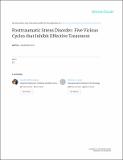Postraumatic Stress Disorder: Five Vicious Cycles that Inhibit Effective Treatment
Author(s)
Ghaffarzadegan, Navid; Larson, Richard C.
DownloadGhaffarzadegan&Larson2015USAMDJ_PTSD Vicious CyclesPublished.pdf (1.706Mb)
Metadata
Show full item recordAbstract
Despite a wide range of studies and medical progress, it seems that we are far from significantly mitigating the problem of posttraumatic stress disorder (PTSD). The problem has major social and behavioral components. Developing innovative and effective policies requires a broad scope of analysis and consideration of the highly interconnected social, behavioral, and medical variables. In this article, we take a systems approach and offer an illustrative causal loop diagram which includes individual and social dynamics. Based on the map, we discuss 5 major barriers for effective interventions in PTSD. These barriers work as vicious cycles in the system, reduce effectiveness and therefore value of PTSD treatment. We also discuss policy implications of this perspective.
Date issued
2015-11Publisher
U.S. Army Medical Department journal
Citation
https://www.researchgate.net/publication/284718283_Posttraumatic_Stress_Disorder_Five_Vicious_Cycles_that_Inhibit_Effective_Treatment [accessed May 18, 2016].